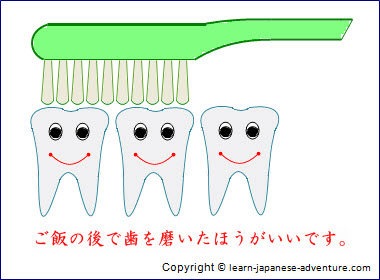- Home
- Intermediate Lessons
- Japanese Expression Suggestion & Advice
Japanese Expression for Suggestion & Advice -
Intermediate Lessons: 30
In this lesson, you'll learn using a Japanese expression to make suggestions or to give advice.

Generally, this expression ends with ~ほうがいいです (~hou ga ii desu). The english equivalent is "It's better to ~" or "You had better ~".
Depending on the situation, this expression may sound like you are imposing your opinion on the listener. Therefore, consider the context of the conversation carefully before using it.
Sentence Patterns
Let's check out the sentence patterns...
| Verb (た-form) | ほうがいいです | → It's better to ... |
| Verb (ない-form) | ほうがいいです | → It's better not to ... |
If you want to suggest something or give advice in a positive way, use the first sentence pattern "Verb (た-form) ほうがいいです".
If you want to suggest or advise in a negative way (i.e. against doing something), use the second sentence pattern "Verb (ない-form) ほうがいいです".
Examples of Japanese Expression using ほうがいいです
You'll normally use this Japanese expression when you're replying someone in a conversation. Let's look at some examples...
|
1. |
A: 頭が痛いです。 |
|
2. |
A: 来週日本へ旅行に行きます。 |
|
3. |
A: 明日試験を受けます。 |
More Examples
|
1. |
ご飯の後で歯を磨いたほうがいいです。 |
|
2. |
暗いから、電気をつけたほうがいいです。 |
|
3. |
熱があるときはゆっくり休んだほうがいいです。 |
|
4. |
分からないときは先生に聞いたほうがいいです。 |
|
5. |
暗い部屋で本を読まないほうがいいです。 |
|
6. |
もう夜遅いから、電話をかけないほうがいいです。 |
|
7. |
彼はもう大人です。あまり心配しないほうがいいです。 |
Suggestions using Japanese Conditional Form たら (tara)
You can also make suggestions by using たら (tara) sentence. For example...
- A: 日本のアニメと漫画が見たいんですが。。。
nihon no anime to manga ga mitain desu ga...
Meaning: I would like to see Japanese anime and manga...
B1: 秋葉原へいったらいいですよ。
akihabara e ittara ii desu yo
Meaning: It would be a good idea if you go to Akihabara.
B2: 秋葉原へいったらどうですか。
akihabara e ittara dou desu ka
Meaning: How about going to Akihabara?
The above example illustrates a situation in which a simple suggestion is given.
In such cases たら (tara) sentence is used. "Verb (た-form) ほうがいいです" implies a comparison and a choice between two things even if it's not expressed in words.
Like I've mentioned before, be careful when you're using this Japanese expression when giving suggestions or advice as depending on situation, it may sound like you are imposing your opinion on the listener.
Therefore, consider the context of the conversation carefully before using it.
Best Deal of the Year! Get 68% OFF Lifetime Premium! Ends on 13 Dec 2025
Click Here to Get 68% OFF Lifetime Premium and be on the fast track to fluency in Japanese.
The link above is an affiliate link, which means that I would earn a commission (at no extra cost to you) if you do end up purchasing the related learning course.
Buy me a coffee









Facebook Comments
Don’t see the comments box? Log in to your Facebook account, give Facebook consent, then return to this page and refresh it.